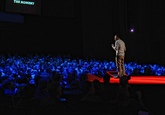1. TED's secret to great public speaking
There's no single formula for a great talk, but there is a secret ingredient that all the best ones have in common. TED curator Chris Anderson shares this secret -- along with four ways to make it work for you. Do you have what it takes to share an idea worth spreading?
2. How to speak so that people want to listen
Have you ever felt like you're talking, but nobody is listening? Here's Julian Treasure to help. In this useful talk, the sound expert demonstrates the how-to's of powerful speaking -- from some handy vocal exercises to tips on how to speak with empathy. A talk that might help the world sound more beautiful.
3. Your body language may shape who you are
Body language affects how others see us, but it may also change how we see ourselves. Social psychologist Amy Cuddy argues that "power posing" -- standing in a posture of confidence, even when we don't feel confident -- can boost feelings of confidence, and might have an impact on our chances for success. NOTE: Some of the findings presented in this talk have been referenced in an ongoing debate among social scientists about robustness and reproducibility. Read "Criticisms & updates" below for more details as well as Amy Cuddy's response.
4. The clues to a great story
Filmmaker Andrew Stanton ("Toy Story," "WALL-E") shares what he knows about storytelling -- starting at the end and working back to the beginning. Contains graphic language ...
5. This is your brain on communication
Neuroscientist Uri Hasson researches the basis of human communication, and experiments from his lab reveal that even across different languages, our brains show similar activity, or become "aligned," when we hear the same idea or story. This amazing neural mechanism allows us to transmit brain patterns, sharing memories and knowledge. "We can communicate because we have a common code that presents meaning," Hasson says.








